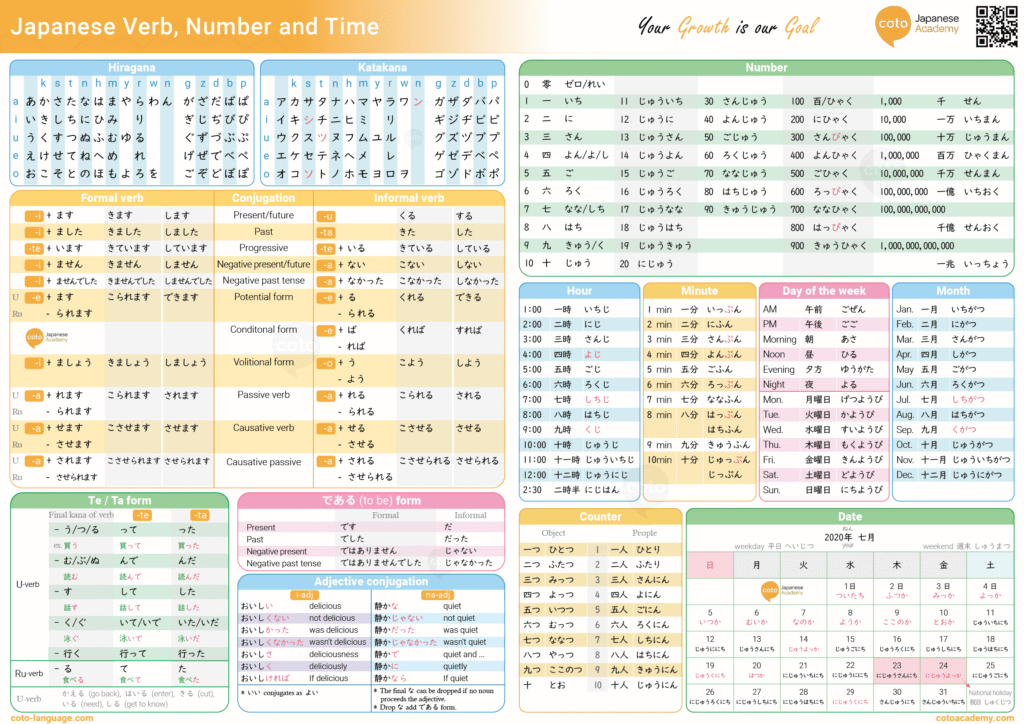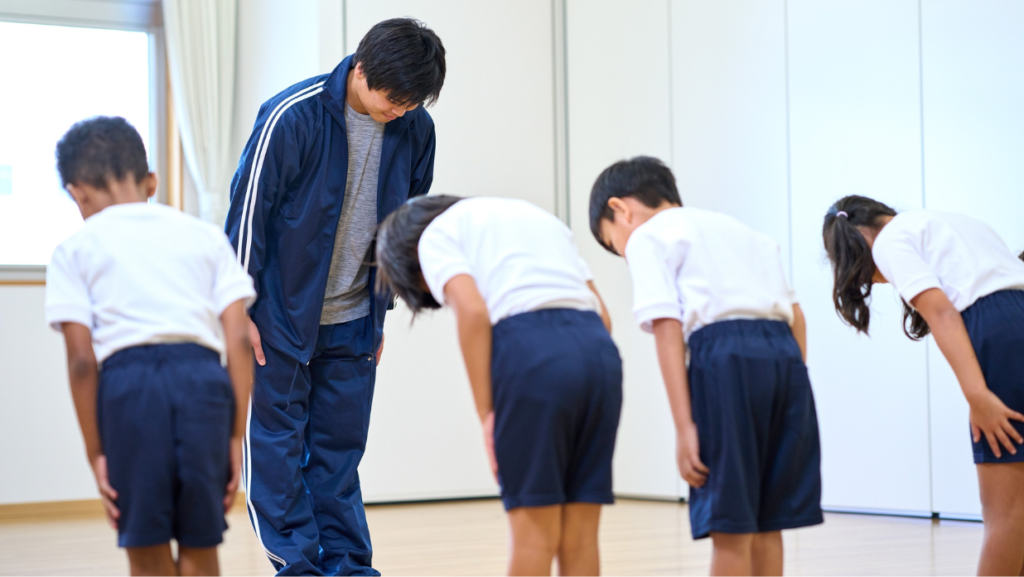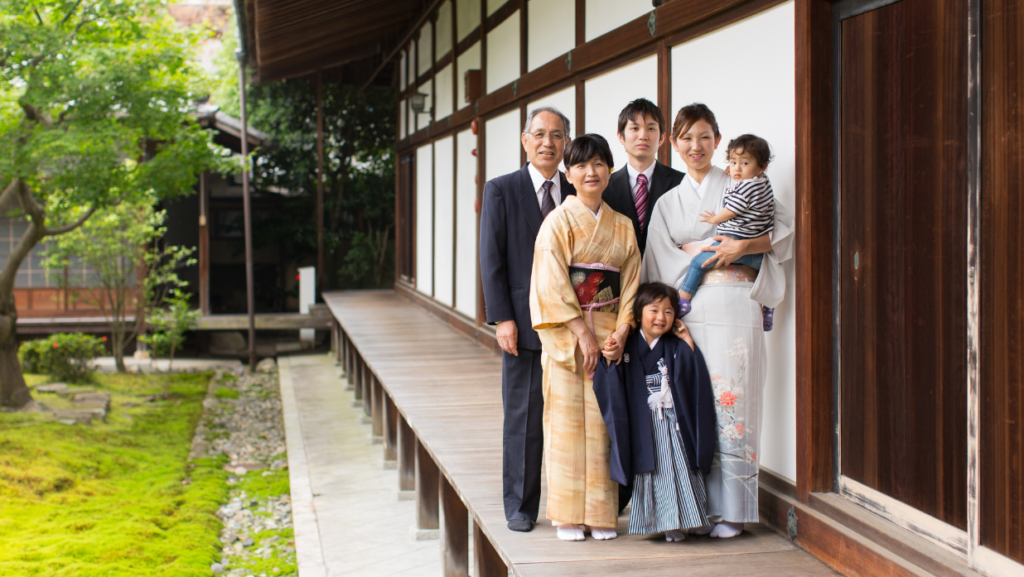Learning Japanese can feel overwhelming at first, but mastering basic greetings and essential vocabulary is a great way to ease into your studies. Whether you’re planning a trip to Japan, interacting with Japanese speakers, or just curious about the language, these words and phrases will help you build a solid foundation. But what are the first 100 Japanese words you need to learn? In this guide, we’ve gathered over 100 of the most useful Japanese words for beginners.
Interested in learning Japanese? Coto Japanese Academy specializes in creating personalized learning experiences for Japanese language learners. Start your language journey with us today!
Download our basic Japanese words cheat sheet!
If you want to learn Japanese words on-the-go, download the picture of our Basic Japanese Word Cheat Sheet below. You can save it to your device and refer to it anytime you want a quick vocabulary boost!

Mastering Basic Japanese Greetings and Essential Words

In order to master Japanese, you have to start by knowing how to greet people. Here are the most common Japanese greetings with their pronunciation and English meaning, essential for any beginner learning Japanese words.
Basic Japanese Words for Greetings
| Japanese | Pronunciation | Meaning |
| おはようございます | Ohayou gozaimasu | Good morning (formal) |
| こんにちは | Konnichiwa | Hello/ good afternoon |
| こんばんは | Konbanwa | Good evening |
| おやすみなさい | Oyasuminasai | Goodnight (formal) |
| ありがとうございます | Arigatou gozaimasu | Thank you |
| すみません | Sumimasen | Excuse me/ sorry |
| ごめんなさい | Gomennasai | Sorry (formal) |
| はい | Hai | Yes |
| いいえ | Iie | No |
Cultural Tip: In Japan, bowing while saying greetings is a common practice and shows respect. Try incorporating a slight bow when greeting people.
Japanese Words Related to Family
Learn how to talk about family members in Japanese with these basic words and phrases.

| Japanese | Pronunciation | Meaning |
| わたし | Watashi | I/me |
| あなた | Anata | You |
| お母さん | おかあさん Okaasan | Mother |
| お父さん | おとうさん Otousan | Father |
| お爺さん | おじいさん Ojiisan | Grandfather |
| お婆さん | おばあさん Obaasan | Grandmother |
| おじさん | Ojisan | Uncle |
| おばさん | Obasan | Aunt |
| お兄さん | おにいさん Oniisan | Older brother |
| お姉さん | おねえさん Oneesan | Older sister |
| 弟 | おとうと Otouto | Younger brother |
| 妹 | いもうと Imouto | Younger sister |
Did you know? The use of honorifics like “-san” adds politeness and respect to family terms. Learn more about Japanese honorifics in our guide.
Counting in Japanese: Basic Words for Numbers 1-10
Numbers are essential in daily life, whether you need to say your date of birth at the city hall or describe how many food items you want at the grocery store. Here are the most basic words you need to count from 1 to 10 in Japanese, with pronunciation and meaning:
| Japanese | Pronunciation | Meaning |
| 一 | いち Ichi | One |
| 二 | に Ni | Two |
| 三 | さん San | Three |
| 四 | し/よん Shi/yon | Four |
| 五 | ご Go | Five |
| 六 | ろく Roku | Six |
| 七 | しち/なな Shichi/nana | Seven |
| 八 | はち Hachi | Eight |
| 九 | きゅう Kyuu | Nine |
| 十 | じゅう Juu | Ten |
Tip: “Shi” (four) is sometimes avoided because it sounds like the word for “death” in Japanese.
Keep in mind that numbers are conjugated differently depending on what you’re counting in Japanese. For a full breakdown on how numbers work in Japanese, please read our guide to Japanese numbers.
Start learning Japanese with a tutor!
Want to learn all the essential Japanese verbs and start speaking with confidence? Join our part-time or intensive Japanese lessons at Coto Academy — Tokyo’s leading language school. Get in touch for a free level check and course consultation today!
Basic Words for Months of the Year in Japanese

Learn the names of the months in Japanese, which is useful for planning travel or for discussing time frames in daily conversations. For a deep dive into months, read our ultimate guide into months, days, and years.
| Japanese | Pronunciation | Meaning |
| 一月 | いちがつ Ichigatsu | January |
| 二月 | にがつ Nigatsu | February |
| 三月 | さんがつ Sangatsu | March |
| 四月 | しがつ Shigatsu | April |
| 五月 | ごがつ Gogatsu | May |
| 六月 | ろくがつ Rokugatsu | June |
| 七月 | しちがつ Shichigatsu | July |
| 八月 | はちがつ Hachigatsu | August |
| 九月 | くがつ Kugatsu | September |
| 十月 | じゅうがつ Juugatsu | October |
| 十一月 | じゅういちがつ Juuichigatsu | November |
| 十二月 | じゅうにがつ Juunigatsu | December |
Days of the Week & Times of the Day in Japanese
The Japanese days of the week are inspired by natural elements like the moon, fire, and water. If you want a full breakdown of the terms for weekdays, read our guide to days of the week. For now, here’s a basic list with meanings and pronunciations.
| Japanese | Pronunciation | Meaning |
| 月曜日 | げつようび Getsuyoubi | Monday |
| 火曜日 | かようび Kayoubi | Tuesday |
| 水曜日 | すいようび Suiyoubi | Wednesday |
| 木曜日 | もくようび Mokuyoubi | Thursday |
| 金曜日 | きんようび Kinyoubi | Friday |
| 土曜日 | どようび Doyoubi | Saturday |
| 日曜日 | にちようび Nichiyoubi | Sunday |
| 昨日 | きのう Kinou | Yesterday |
| 今日 | きょう Kyou | Today |
| 明日 | あした Ashita | Tomorrow |
| 朝 | あさ Asa | Morning |
| 昼 | ひる Hiru | Noon |
| 夕方 | ゆうがた Yuugata | Evening |
| 夜 | よる Yoru | Night |
Quick Fact: The days of the week are named after natural elements such as the moon (Getsu) and fire (Ka).
Must-Know Japanese Adjectives
Adjectives help you describe people, food, and everyday life in Japanese. In order to describe an experience or whether a restaurant is tasty, you will need to know adjectives. Here are the most common terms for beginners.
| Japanese | Pronunciation | Meaning |
| 楽しい | たのしい Tanoshii | Happy |
| 悲しい | かなしい Kanashii | Sad |
| 高い | たかい Takai | High/expensive |
| 低い | ひくい Hikui | Low |
| 安い | やすい Yasui | Cheap |
| 早い | はやい Hayai | Fast/early |
| 遅い | おそい Osoi | Slow |
| 忙しい | いそがしい Isogashii | Busy |
| 美味しい | おいしい Oishii | Delicious |
| 不味い | まずい Mazui | Awful |
| 甘い | あまい Amai | Sweet |
| 塩っぱい | しょっぱい Shoppai | Salty |
| 酸っぱい | すっぱい Suppai | Sour |
| 苦い | にがい Nigai | Bitter |
| 辛い | からい Karai | Hot/ spicy |
| 熱い | あつい Atsui | Hot |
| 暖かい | あたたかい Atatakai | Warm |
| 冷たい | つめたい Tsumetai | Cold |
| 明るい | あかるい Akarui | Bright |
| 暗い | くらい Kurai | Dark |
Try This: Describe your meal using these adjectives next time you eat Japanese food!
While this is a basic list of Japanese adjectives, to fully understand how adjectives work, please read: 100 common adjectives in Japanese.
Common Japanese Verbs for Daily Use
Verbs are the backbone of sentences. Master these essential Japanese verbs for daily conversations. For a full list of verbs in Japanese, check out: 100 Basic Japanese Verbs for Beginners!
| Japanese | Pronunciation | Meaning |
| する | Suru | To do |
| 見る | みる Miru | To see |
| 聞く | きく Kiku | To listen |
| 話す | はなす Hanasu | To talk/speak |
| 言う | いう Iu | To say |
| 書く | かく Kaku | To write |
| 食べる | たべる Taberu | To eat |
| 飲む | のむ Nomu | To drink |
| 歩く | あるく Aruku | To walk |
| 走る | はしる Hashiru | To run |
| 座る | すわる Suwaru | To sit |
| 立つ | たつ Tatsu | To stand |
Practice Tip: Create sentences combining verbs with nouns, like “ごはんを食べる” (Gohan o taberu – I eat rice).
Food-related Japanese Vocabulary
Food is central to Japanese culture. Learn basic Japanese food words to enhance your dining experience.
| Japanese | Pronunciation | Meaning |
| 食べ物 | たべもの Tabemono | Food |
| 飲み物 | のみもの Nomimono | Drinks |
| ご飯 | ごはん Gohan | Rice/meal |
| 水 | みず Mizu | Water/cold water |
| お湯 | おゆ Oyu | Hot water |
| 肉 | にく Niku | Meat |
| 野菜 | やさい Yasai | Vegetable |
| 魚 | さかな Sakana | Fish |
| ラーメン | Ra-men | Ramen |
| 寿司 | すし Sushi | Sushi |
| おにぎり | Onigiri | Onigiri |
Shopping or dining in Japan? We have an ultimate guide for key terms to know and how to read food menus and ingredient labels.
Tips to Build Basic Japanese Vocabulary
Building vocabulary is a continuous journey. The more advanced you become in Japanese, the more words you’ll need to learn. For example, to pass the JLPT N3, you need to know around 3,700 vocabulary words! That might sound like a lot, and even starting with 100 words can feel intimidating. But don’t worry. Here are some tips to make the process more manageable and enjoyable:
1. Group vocabulary based on themes and function
If you’re just starting out, organizing words by topic can make learning much easier. You can group words related to food, family, numbers, or other daily-life themes. Breaking big chunks of vocabulary into smaller categories helps your brain “digest,” process, and remember them more effectively. You can also organize words by part of speech, like verbs, adjectives, nouns, and pronouns, to better understand how they function in sentences.
2. Build slowly, over time
A common mistake is trying to cram too many words in a single day. Even if you memorize 100 words in one session, chances are you’ll forget most of them the next day. The key is consistent, gradual learning. For example, learning 10 words per day will give you 100 words in just 10 days. Always make time for review, revisiting words learned the previous day or week, to reinforce long-term memory.
3. Apply them in a sentence
The best way to truly learn Japanese is by using new words in context. Look at example sentences, try writing your own, or practice speaking them out loud, even to yourself in the mirror! Conversation-focused lessons, like those at Coto Academy, are excellent because you immediately apply what you learn in real-life situations. The more you use words actively, the faster they stick.
Start taking Japanese lessons and master these 100 basic Japanese words!
For the next step after learning these basic Japanese words, equip yourself with basic Japanese grammar.
But memorization alone isn’t enough; real progress comes from putting these words into practice through conversation.
At Coto Academy, our professional Japanese teachers specialize in helping beginners build confidence and fluency. Through practical, conversation-focused lessons, you’ll learn how to use these basic words in everyday situations, and gradually expand your vocabulary and grammar.
Interested? Check out our intensive Japanese courses or any of our other in-person or online courses that fit your needs. Feel free to fill out the form below if you have any questions!
FAQ
What Japanese words should I learn first?
Start with greetings and polite expressions like:
- おはようございます : Ohayou gozaimasu (Good morning)
- ありがとうございます : Arigatou gozaimasu (Thank you)
- すみません : Sumimasen (Excuse me / Sorry)
These words will help you navigate basic conversations respectfully.
What is “gozaimasu”?
Gozaimasu is a polite ending often added to expressions to show respect. For example, “Arigatou gozaimasu” is a formal way of saying “thank you.”
Is 1 year enough to learn Japanese?
It depends on your goals. In one year, with consistent study and practice, you can achieve conversational proficiency in daily scenarios. However, mastering advanced grammar and kanji will take longer. At Coto Japanese Academy, our tailored courses and immersive programs are designed to help you maximize your learning and see real progress within a year.
How do I introduce myself in Japanese?
A basic introduction looks like this:
- “よろしくおねがいします (Yoroshiku onegaishimasu)” – Please treat me well.
- “はじめまして (Hajimemashite)” – Nice to meet you.
- “わたしのなまえは [Your Name] です (Watashi no namae wa [Your Name] desu)” – My name is [Your Name].
What does “moshi moshi” mean?
Moshi moshi (もしもし) is a greeting used when answering the phone in Japanese. It’s informal and typically used among friends or family.
What are some good resources for learning Japanese?
- Flashcard apps like Anki for vocabulary.
- Language exchange apps like HelloTalk.
- Enrolling in immersive courses like our 3-month intensive program.
Why are there two words for “four” (shi/yon)?
“Shi” is often avoided because it sounds like the word for “death,” so “yon” is used more commonly in daily life.
What are the most useful Japanese words for beginners?
Greetings such as こんにちは (Konnichiwa – Hello), ありがとうございます (Arigatou gozaimasu – Thank you), and everyday basics like numbers, family terms, and food words are essential starting points.
How do you say family members in Japanese?
Common terms include お母さん (Okaasan – Mother), お父さん (Otousan – Father), お兄さん (Oniisan – Older Brother), and 妹 (Imouto – Younger Sister).
What are the Japanese numbers 1 to 10?
They are: いち (Ichi), に (Ni), さん (San), し/よん (Shi/Yon), ご (Go), ろく (Roku), しち/なな (Shichi/Nana), はち (Hachi), きゅう (Kyuu), じゅう (Juu).
How can I practice using basic Japanese words?
Try short conversations with native speakers, use flashcards for recall, or join a language school like Coto Academy, where teachers help you practice real-life conversations using these basics.
Is it better to learn words or grammar first in Japanese?
Beginners benefit from learning essential words and phrases first, then gradually applying them within simple grammar structures to build practical conversation skills.
Do you have all the foundation you need to learn Japanese? Find more useful, beginner-level learning content below!
- What is Katakana? Free Katakana Chart and Learning Guide
- What is Hiragana? Free Hiragana Chart
- 10 Basic Japanese Phrases You Need to Know
The post 100+ Basic Japanese Words for Beginners to Learn appeared first on Coto Japanese Academy.
Article source: https://cotoacademy.com/top-100-basic-japanese-words/

